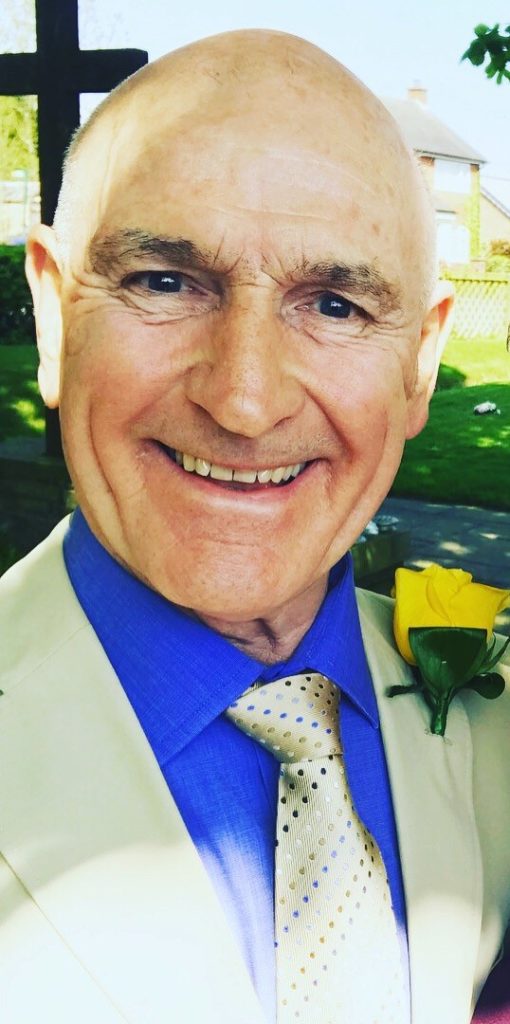News Hub
Family of Leicestershire “miracle man” close to death praise lifesaving air ambulance

After being attended by the critical care crew of the local air ambulance when he had a cardiac arrest in Coalville town centre, Mick Bishop (72) was admitted to Leicester’s Glenfield Hospital.
Staff in the Intensive Care Unit put the retired painter & decorator into an induced coma and did all they could to stabilise his condition – but he did not respond to treatment.
Mick’s family were told to prepare themselves for the worst and friends and relatives visited him at the hospital to say their last goodbyes.
After two days keeping a bedside vigil the unthinkable happened when Mick first started moving and then opened his eyes and spoke!
The doctors called him “Miracle Mick” and after being diagnosed with an enlarged heart and fitted with a defibrillator pacemaker he was discharged from hospital after just two weeks.
His grateful family have raised £2,200 for Derbyshire, Leicestershire & Rutland Air Ambulance in thanks for flying to Mick’s aide and taking over from passers-by and shop staff who started CPR on him when he collapsed in January 2019.
“There is nothing we can do to express the level of gratitude our family has for the air ambulance getting to dad so quickly and the part the critical care crew played in helping to save his life,” says Mick’s daughter Catherine Bishop from Ibstock.
“The hospital doctors were amazed that dad survived, and the only explanation seems to be that there must have been an almost undetectable level of cardiac output which meant oxygen was still getting to dad’s brain – even though all the readings indicated he was effectively brain dead. We believe that having the air ambulance bring the critical care team to treat dad at the scene must have played a huge part in his incredible outcome.”
It took the helicopter just seven minutes to arrive in Coalville town centre where Mick collapsed in the Belvoir Shopping Centre. It landed in a nearby car park.
When the air ambulance doctor and critical care paramedic arrived, Mick was already being resuscitated by colleagues from the ambulance service.
A LUCAS mechanical CPR device was fitted to Mick to provide consistent compressions to his chest. These machines are carried on the air ambulance helicopters and critical care cars but not on ambulances.
Due to the heart rhythm Mick was in, he received three further defibrillation shocks to restart his heart which proved successful.
As he was critically unwell and requiring specialist cardiac surgery, the air ambulance crew anaesthetised Mick at the roadside and then spoke to the surgical team at Glenfield Hospital.
It was agreed that his best and probable only chance of survival was to be taken there for surgery – so the air ambulance critical care team escorted Mick to the hospital, in the back of an ambulance, as his condition was too unstable, and he was too unwell to fly.
“I can’t put into words how amazing the local air ambulance is. As the family knows it is a charity and always in need of funds, we wanted to organise an event to raise some money,” explains Catherine.
They held a successful disco party and raffle which enabled them to buy a defibrillator to be installed in the town centre near to where Mick had his cardiac arrest as well as making a donation to DLRAA.
Mick is now back to full health. His attitude to life has changed somewhat since he nearly died and according to Catherine he is “a lot more relaxed and has a more positive outlook.”
What the family went through for three days after Mick collapsed was, she says “a whirlwind – going from the worst to the best time ever, from sitting around in the depths of despair waiting for dad to pass, to elation when we knew he was not going to die.”
“We will do anything to help the local air ambulance and hope that by sharing dad’s story we raise awareness of and funds for the lifesaving work they do 24/7,” she adds.
The charity needs the public’s support now more than ever as it recently launched two brand-new state-of-the-art replacement aircraft to continue getting its crew to the scene of an incident to deliver the highest level of pre-hospital emergency care to patients like Mick.

